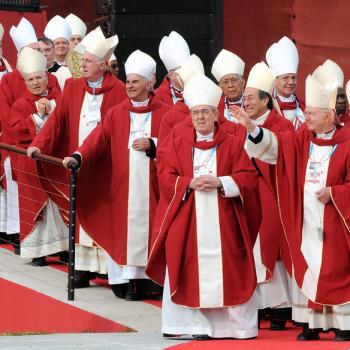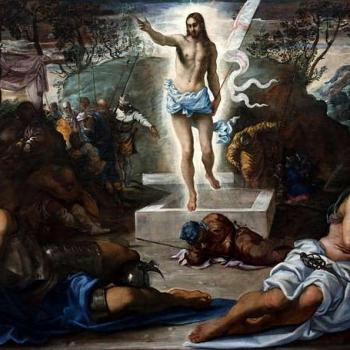Threlfall-Holmes’ story reminds me of a similar experience I myself had with another of England’s metaphysical poets: John Donne. I was a university student at the time, taking an upper-level course on Donne. But while Threlfall-Holmes encountered Herbert as an atheist, I encountered Donne as a Christian. In his writing—especially in the Holy Sonnets—I found a kindred spirit, a comforter who knew the same vacillation between despair and joy which I had myself found in the Christian faith. This was a man who knew both the cross and resurrection.
But while I saw Donne’s applicability to my own situation, and took frequent comfort in his words, I confess I wondered what my other classmates must think of him. To be sure, one need not be a Christian to appreciate Donne. He wrote plenty of non-religious poetry after all. And even in his religious poetry, the non-religious can take pleasure in Donne’s creative genius. But did my classmates care about the subject of such poetry? I doubted it.
My concern only grew as we moved from Donne’s poetry to his prose. Now, I thought, interest in Donne would wane. I recall in particular one class for which our assigned reading was Donne’s Devotions upon Emergent Occasions. In this work, written when he was seriously ill, Donne reflects on death and dying well. It is to this work that we owe phrases like “No man is an island” and “Never send to know for whom the bell tolls; it tolls for thee.”
The book was interesting, to be sure, but I wondered what my classmates would make of it. This was not poetry, even if it was poetic. Would they even consider it literature? I confess that as I went to class that day, I did not expect much. I had convinced myself that discussion of the book would be, at best, limited.
I was shocked to discover the opposite. My classmates were engaged—extremely engaged—by this centuries-old reflection on sickness and death. And this wasn’t merely academic reflection on the book; students were sharing their own griefs and fears about death. This was personal confrontation with Donne’s subject, deeply felt. As discussion continued, a question was even posed to an avowed atheist in the class: “How, without faith do you reconcile yourself to the idea of death?” How, in other words, do you live without hope for something more?
The student drew herself up, ready to make a defense. But then, she seemed to deflate. She noted that in her own life, at a time of great trial, it was in the writing of another dead Christian that she had found comfort. “And I don’t know why,” she concluded. In this answer there were hints of brokenness—a recognition that Donne seemed to know something beyond her own experience.
No doubt, some of my class’ engagement with Devotions upon Emergent Occasions is attributable to our professor. She was (and remains) a gifted Donne scholar, and her enthusiasm for her subject inspired ours. But it was not her enthusiasm alone which spurred discussion that day. Instead, my classmates found in Donne a deeply intellectual and moving encounter with death—potent words which pressed them to examine their own beliefs.
I was reminded that day of the value of studying literature. It is not merely that we gain pleasure or delight from reading, though we gain that too. Rather, we read to engage in conversation—to allow voices from the past to share their wisdom with us. The ideas with which these writers have wrestled, and their insights in these subjects, still matter. They have power, God working through them, to change lives even today.
I would add that George Herbert played an important role in my becoming a Lutheran. (Not that he was one, exactly, though coming pretty close. But Herbert helped to show me how the Gospel and the Sacraments, the Word of God and the Liturgy, can all work together in a theology of grace.)
And Donne’s Devotions upon Emergent Occasions–famous for its phrases, “No man is an island,” “Ask not for whom the bell tolls, it tolls for thee”–has what has to be some of the most beautiful, powerful, and evocative prose in the English language.












